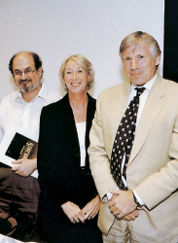|
|
 |
 |
 |
 |
|
AROUND
THE QUADS
President Lee C. Bollinger’s current and former schools, Columbia and Michigan, are teaming with the Royal Shakespeare Co. to bring Salman Rushdie’s allegorical novel, Midnight’s Children (Penguin USA, reprint 1995), to the stage and to the United States for the first time. The New York production, presented by Columbia, will be staged at the Apollo Theater on 125th Street from March 21–30. It will be the centerpiece of what University leaders envision as an education and humanities festival that also may include lectures, readings, discussions, student papers and film and musical presentations. Midnight’s Children will be presented in London in January and February and on the Michgan campus in Ann Arbor on March 12–16. Midnight’s Children, which won the Booker Prize in Britain, is a complex work combining three main tales: the turbulent history of 20th-century India, Pakistan and Bangladesh; the saga of a Muslim family; and the story of one man, Saleem Sinai, whose telepathic powers allow him to communicate with other children born at the stroke of midnight on August 15, 1947, the first hour of Indian independence. The show builds upon scripts that Rushdie wrote for a five-part serialization of the 1981 novel for the BBC; the project was canceled shortly before it was to be filmed in Sri Lanka because of political upheaval there. Rushdie estimated that the play might run around three hours, and he expects 20 actors to play 60 or 70 roles. One advantage of doing a play rather than a movie, he said, is that theater audiences are more willing to accept actors who play children and adults. “It’s more fun to do it onstage,” he said. “You just say to the actors: ‘At this point, you are 10 years old. At another point, you are grown up.’” For Bollinger, the production marks the beginning of what he envisions as Columbia’s expanded role in the arts. A legal scholar who is married to an artist, Jean Magnano Bollinger, Bollinger has said repeatedly that universities should help nourish contemporary arts. When Bollinger was president at Michigan, the University Musical Society, its affiliated performing arts presenting organization, joined with the university to help the Royal Shakespeare Co. produce Shakespeare’s historical dramas. The company performed at Michigan last year, and the performances were accompanied by lectures, discussions and other educational events for the campus and the community. Similar events are planned in New York. “This is not simply a performing arts organization saying, ‘Watch this performance,’ ” Bollinger noted. “It will be much more: the integration of the arts organization and the University. It will be great for the University, great for the cultural institution and great for society.” It is expected that audiences will have the opportunity to enrich their experience of Midnight’s Children by participating in discussions with Rushdie as well as roundtables and dialogues with Columbia faculty, South Asian writers and the artists from the RSC production team. Themes such as the history of the region, the era of colonialization and its aftermath, the relationship of literature and politics, and the current political climate in the region will be explored. In addition, online materials will be created including webcasts, e-seminars and interactive discussion groups. New York City public high school students and teachers in surrounding communities also will benefit, having the opportunity to attend special school performances and to become deeply immersed in the play’s themes of nationhood, cultural history and religious, racial and ethnic diversity. The RSC Education Department is collaborating with the Double Discovery Center to provide in-class workshops to prepare New York City students for the performance. “Universities and cultural institutions are natural allies in seeking to understand the human condition,” said Bollinger. “When they work together, the best of both worlds are integrated and intellectual growth is fostered through panel discussions, academic courses and lectures that complement the artistic endeavor. Both art and the entire academic community — including students, faculty and our neighbors — benefit dramatically. I believe part of the role of the University is to nurture a vital and thriving modern culture, and it is my hope that Columbia will continue to find ways to connect with the arts and our neighboring community.” Bruce Ferguson, dean of the School of the Arts, noted how this
production and the plans for a new home for the School of the Arts
on 125th Street “underscore Columbia’s commitment to
Harlem through the arts.” And Dean of the College Austin Quigley
emphasized that this production should not be viewed as a “one-shot
deal” but rather as “the beginning of a serious effort
to redefine Columbia University’s role not only in the surrounding
community but on the national scene.” |
|
|||||||||||||||||||||||||||||||||||||||||||||||||||
